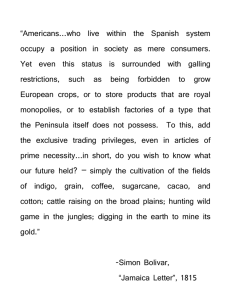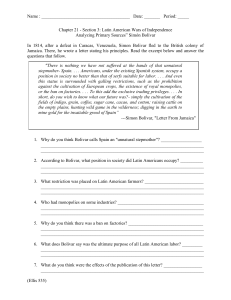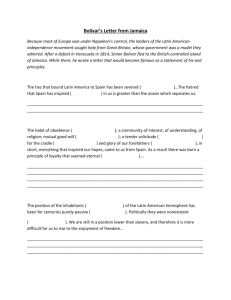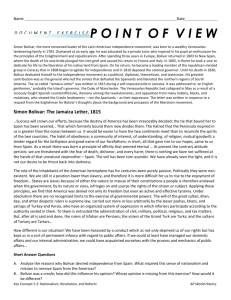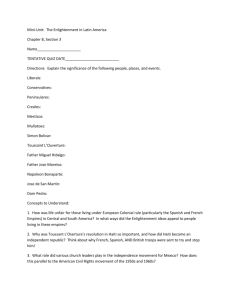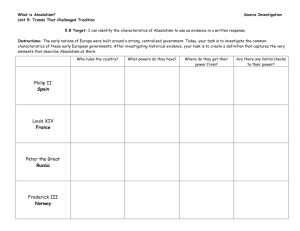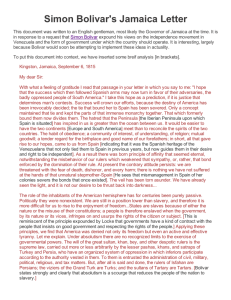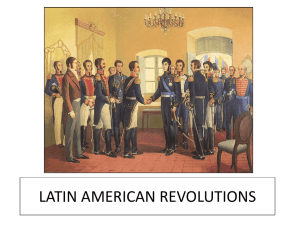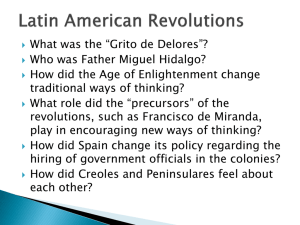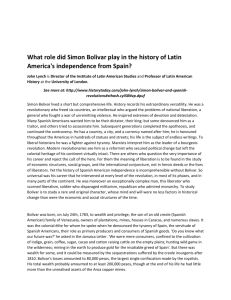Declaration of Independence with Simon Bolivar's Jamaica Letter
advertisement
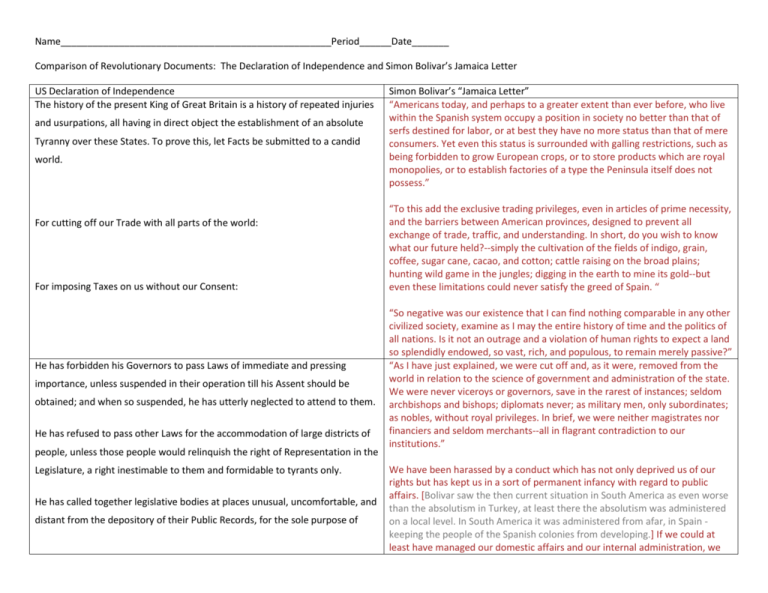
Name___________________________________________________Period______Date_______ Comparison of Revolutionary Documents: The Declaration of Independence and Simon Bolivar’s Jamaica Letter US Declaration of Independence The history of the present King of Great Britain is a history of repeated injuries and usurpations, all having in direct object the establishment of an absolute Tyranny over these States. To prove this, let Facts be submitted to a candid world. For cutting off our Trade with all parts of the world: For imposing Taxes on us without our Consent: He has forbidden his Governors to pass Laws of immediate and pressing importance, unless suspended in their operation till his Assent should be obtained; and when so suspended, he has utterly neglected to attend to them. He has refused to pass other Laws for the accommodation of large districts of people, unless those people would relinquish the right of Representation in the Legislature, a right inestimable to them and formidable to tyrants only. He has called together legislative bodies at places unusual, uncomfortable, and distant from the depository of their Public Records, for the sole purpose of Simon Bolivar’s “Jamaica Letter” “Americans today, and perhaps to a greater extent than ever before, who live within the Spanish system occupy a position in society no better than that of serfs destined for labor, or at best they have no more status than that of mere consumers. Yet even this status is surrounded with galling restrictions, such as being forbidden to grow European crops, or to store products which are royal monopolies, or to establish factories of a type the Peninsula itself does not possess.” “To this add the exclusive trading privileges, even in articles of prime necessity, and the barriers between American provinces, designed to prevent all exchange of trade, traffic, and understanding. In short, do you wish to know what our future held?--simply the cultivation of the fields of indigo, grain, coffee, sugar cane, cacao, and cotton; cattle raising on the broad plains; hunting wild game in the jungles; digging in the earth to mine its gold--but even these limitations could never satisfy the greed of Spain. “ “So negative was our existence that I can find nothing comparable in any other civilized society, examine as I may the entire history of time and the politics of all nations. Is it not an outrage and a violation of human rights to expect a land so splendidly endowed, so vast, rich, and populous, to remain merely passive?” “As I have just explained, we were cut off and, as it were, removed from the world in relation to the science of government and administration of the state. We were never viceroys or governors, save in the rarest of instances; seldom archbishops and bishops; diplomats never; as military men, only subordinates; as nobles, without royal privileges. In brief, we were neither magistrates nor financiers and seldom merchants--all in flagrant contradiction to our institutions.” We have been harassed by a conduct which has not only deprived us of our rights but has kept us in a sort of permanent infancy with regard to public affairs. [Bolivar saw the then current situation in South America as even worse than the absolutism in Turkey, at least there the absolutism was administered on a local level. In South America it was administered from afar, in Spain keeping the people of the Spanish colonies from developing.] If we could at least have managed our domestic affairs and our internal administration, we fatiguing them into compliance with his measures. He has dissolved Representative Houses repeatedly, for opposing with manly firmness his invasions on the rights of the people. He has combined with others to subject us to a jurisdiction foreign to our constitution, and unacknowledged by our laws; giving his Assent to their Acts of pretended Legislation: could have acquainted ourselves with the processes and mechanics of public affairs. We should also have enjoyed a personal consideration, thereby commanding a certain unconscious respect from the people, which is so necessary to preserve amidst revolutions. That is why I say we have even been deprived of an active tyranny, since we have not been permitted to exercise its functions. The role of the inhabitants of the American hemisphere has for centuries been purely passive. Politically they were nonexistent. We are still in a position lower than slavery, and therefore it is more difficult for us to rise to the enjoyment of freedom...States are slaves because of either the nature or the misuse of their constitutions; a people is therefore enslaved when the government, by its nature or its vices, infringes on and usurps the rights of the citizen or subject. [This is reminiscent of the principle expounded by Locke that governments have a kind of contract with the people that insists on good government and respecting the rights of the people.] 1. Thesis. Compose a thesis comparing AND contrasting the causes of revolution in North and South America. Be sure to establish categories for comparison based on the information above. 2. Evaluation. What do you think is the most important category of cause from the comparison above? Why? 3. Global/interregional context. In what way were both North and South America effected by other regions?
